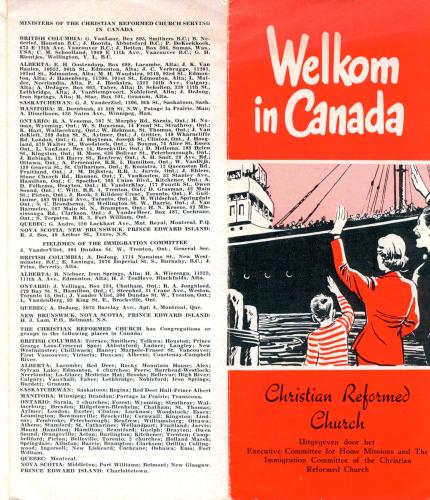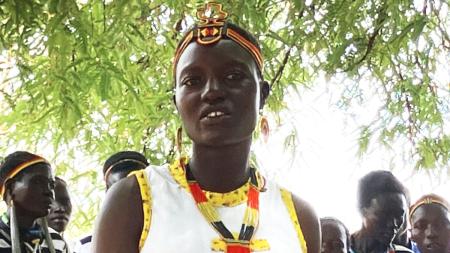CRCs in Canada Asked to Join in Country’s 150th Birthday

A pamphlet used by members of the Canadian CRC to welcome immigrants to the country.
CRC Archives
Rev. Arie Van Eek well remembers his family’s move from their tulip farm in the Netherlands to Canada in the years after World War II.
In the Netherlands, the landscape had been nearly obliterated by fighting between the Allies and the German forces, spurring Dutch government officials to encourage people such as Van Eek and his family to move.
“My father went to meetings where there were government-sponsored agents saying that Canada was so big, so rich, and in need of workers,” said Van Eek, worked for many years with World Renew.
“We were excited about the chance to go, but we didn’t know anybody in the country,” he said.
Even so, the local CRC pastor was there to greet them when their train pulled into the station of the small southern Ontario town where they would live.
Soon they met many other Dutch-immigrant families and, although finding work and a place to live were hard at first, they settled in and prospered, said Van Eek.
Strong memories of the welcome that his family received have encouraged Van Eek to participate on a committee that is seeking to encourage Canadian CRC members to join in this year’s 150-year celebration of the nation’s confederation.
“We want our churches to celebrate the years of God’s grace that we have received in every measure of life since coming to Canada,” said Van Eek. “We need to look at Canada at its 150th and see that God has blessed us abundantly.”
New Year’s Day kicked off the special celebration across Canada with fireworks and speeches, special community gatherings and events. Many more are planned throughout 2017.
For Reformed Christians, suggests the Canada 150 committee, this can be more than a national celebration.
Peter Noteboom, a member of the Canada 150 committee who also serves as the development director for CRC Canadian Ministries, said that one of the main things they are encouraging people to do, with their congregations, is “to participate in their local community events.”
“We also would like our churches to connect with the contributions our churches have made, such as the work that we have been doing in the area of justice,” he said.
For instance, said Noteboom, “This could be a time in which we think about the damage caused by churches from many denominations that failed to speak out about the injustices done in the residential schools for Indigenous people.”
The committee is still in the process of connecting with churches and considering resources that could be of use this year, but here are a few ideas that the committee is suggesting already:
- Many communities are planning sesquicentennial events. Perhaps your local community has plans for a Canada Day celebration, a parade, or special acts of service. Your church could use this as an opportunity to reach out as a local congregation and join your neighbors.
- Canada has been a hospitable home to generations of immigrants, including many who founded the CRC denomination in Canada. Celebrate and give thanks for this heritage by offering hospitality to today’s newcomers. Perhaps your congregation could sponsor a refugee or provide support to refugees sponsored by others in your community. Maybe you could volunteer or raise support for a local welcome center or nonprofit organization. Think of the gifts that your church has to offer, and then extend them to new Canadians in your area.
- While we celebrate 150 years of confederation, the land Canada exists on is much older. As we mark the sesquicentennial, it is also a perfect time to take action as a congregation in lamenting our country’s history of mistreatment of Indigenous peoples so that we may live equitably and peacefully together.
- Consider holding special orders of service and liturgies for Canada Day on Saturday, July 1, and for Thanksgiving on Monday, Oct. 9.
Dick Harms, the CRC archivist at Calvin College in Grand Rapids, Mich., said the first CRC congregations in Canada were founded in the early 20th century by farmers who migrated north from the Dakotas and Montana into Alberta.
A CRC congregation was also started in the 1920s in Windsor, Ont., by a CRC Home Missions missionary who had been starting churches in southeastern Michigan.
After World War II, Dutch people left the Netherlands primarily for Canada and Australia and New Zealand, said Harms.
Meanwhile, a CRC committee was established in Canada to help resettle people from the Netherlands, he said.
The majority of people came from the Netherlands between 1946 and 1960, and many of them arrived at Pier 21 in Halifax, the harbor in Nova Scotia that served as Canada’s Ellis Island — which for many years was the main entry point in the U.S. for immigrants.
“Many people who have played important roles in our denomination were among those whose families came and settled in Canada after the war,” said Harms.
Check The Network, which will soon be offering more information on Canada’s 150th celebration and ways in which CRC congregations and members can participate.


